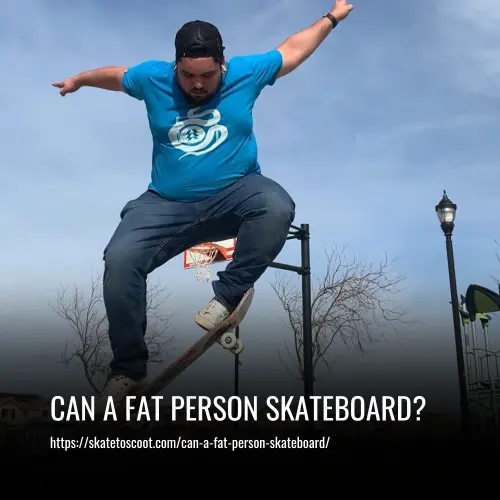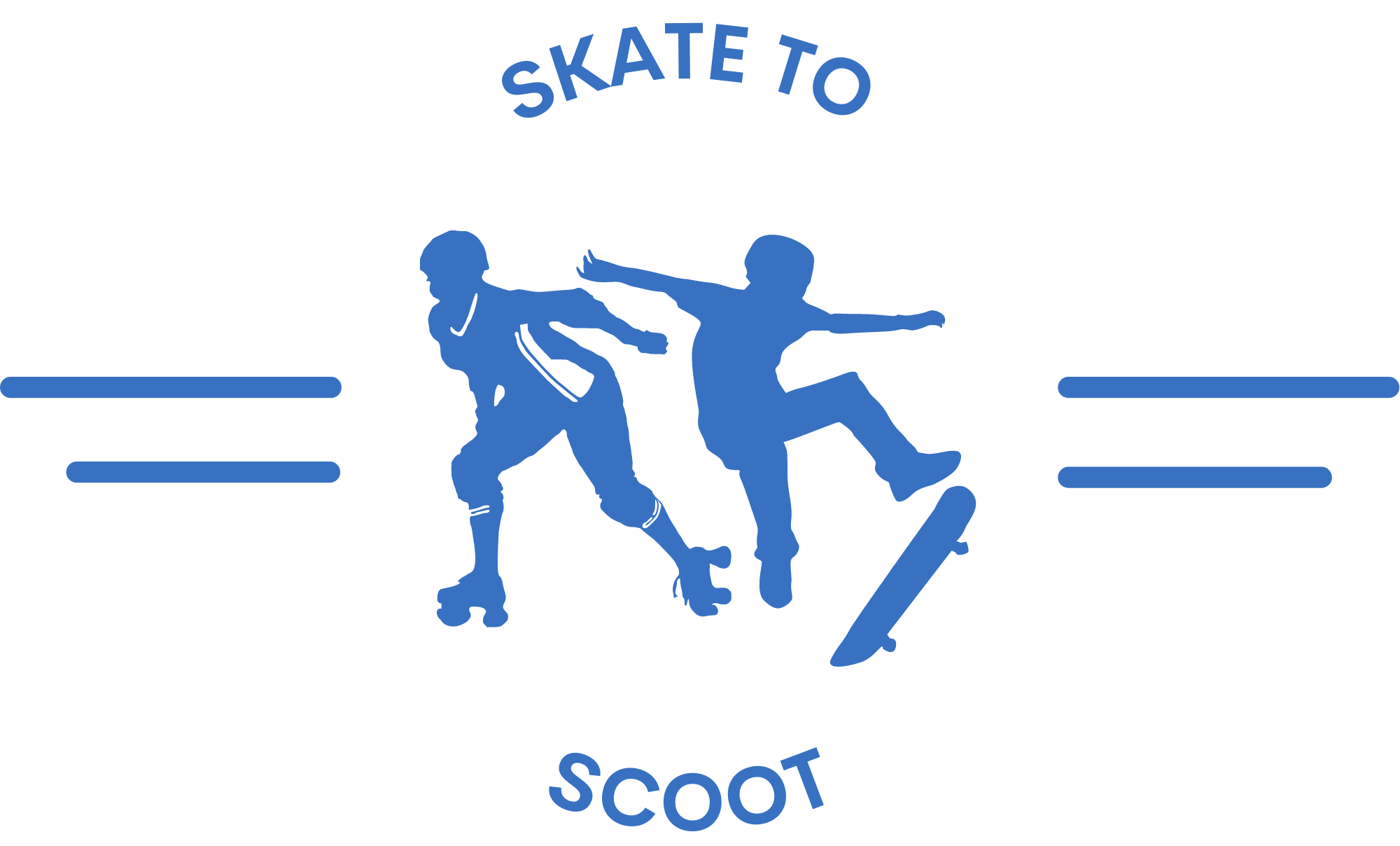Can a Fat Person Skateboard? Here’s What You Need to Know
This post contains affiliate links. As an Amazon Associate, we earn from qualifying purchases.
Can fat people skateboard? Absolutely! There is nothing physical stopping them from joining the world of skateboarding, just as there isn’t for anyone else. However, heavier people do need to take extra precautions when it comes to skating, such as wearing protective gear and making sure they take frequent breaks.
Additionally, heavier skaters might be more prone to sprains since they are more prone to larger forces of impact when they fall due to their weight. Despite these minor details, fat people can still enjoy the sport of skateboarding and make progress toward learning how to do tricks.
It’s also important to keep in mind that no one should feel too self-conscious about their weight at the skatepark–everyone is simply trying their best and enjoying this pastime.

Does Weight Affect Skateboarding
Does weight have an impact on skateboarding? Absolutely! A heavy rider might find it challenging to do tricks or advanced maneuvers due to the increased weight making it more difficult to perform. However, with the right board and the correct landing techniques, a heavier rider can still navigate the board with relative ease for basic cruising, grinding, or carving.
Modern-day skateboards are designed to be extra durable to hold up against heavier weights. In other words, if you want to try skateboarding no matter your size, you can trust that today’s boards are able to handle the challenge; just keep in mind that some tricks may require extra caution and proper landing techniques.
Is Skateboarding Dangerous For Fat Guys
Skateboarding can be dangerous for anyone, but it is especially risky for larger guys who are just starting out. Balancing is a crucial factor to consider before stepping onto your board, as it’s easy to lose control and balance if you don’t know what you’re doing. But with careful practice, fat guys can learn the basics of skateboarding without risk of injury.
The most important thing to keep in mind when skateboarding as a larger guy is to wear all the required safety gear. This will help protect you in case of an unexpected fall or collision. You should also take care to move slowly and only push off one foot at a time instead of trying to quickly launch yourself down the street.
Doing so will help you stay in control and land any tricks with precision. Ultimately, with proper knowledge and safety precautions, any skater – regardless of size – can quickly become a pro!
What is the Weight Limit for Skateboarding
The weight limit for skateboarding mainly depends on the size of the deck and how often it is used. A deck that is 8 1/2″ x 31″ in size can comfortably handle the weight of a 50-pound (22.7 kg) individual; however, someone who is significantly heavier, weighing 200 pounds (90.7 kg), could potentially break it down into just two years due to excessive wear and tear.
Typically, any board has a capacity of at least 300 pounds (136.1 kg), however, the excessive strain could result in the board breaking or warping eventually. While some skaters may be willing to replace their decks regularly, others are looking for boards that can last much longer – so the heavier you are, the more often you might need to get a new one!
Will Skateboarding Be Harder to Learn for a Fat Person
Yes, skateboarding can be harder to learn when you are overweight. It’s true that carrying too much extra fat increases stress on your knees and decreases flexibility, as well as reduces cardiovascular health — all of which can make learning skateboarding more difficult. But don’t throw in the towel just yet!
Despite having extra weight, some people still enjoy skateboarding and can even become quite skilled. Learning any new skill is hard and progress might seem slow, but don’t let your weight get you down — if you put in the work and practice regularly, you will see results. The same goes for everyone — no matter what size they are!
Do Overweight Skaters Get Hurt More Easily
The answer to the question of whether overweight skaters are more likely to get hurt is yes and no. When it comes to blunt force injuries, such as falling onto the pavement, being overweight can offer some cushioning, although it also increases the impact due to the higher weight.
This means that while a skinny and fat skater will fall at the same rate due to gravity, the momentum of the fat skater will be much higher—leading to a higher force of impact than their skinny counterpart.
Although there may be some cushioning for most falls, extra fat doesn’t help when it comes to more delicate injuries like sprained ankles. Our tendons and ankles are quite fragile, and being overweight can increase the chance of these types of injuries occurring.
For those wanting to minimize their risk when skateboarding, wearing proper protective gear such as a helmet, knee pads, and wrist guards are essential – especially for beginners or heavier people who might need extra protection from falls or wrist sprains.
In addition, doing tricks or street skating can be rough on your joints regardless of your size – so taking good care of them is key!
Do Fat Skaters Need a Different Deck Size
Absolutely! As a heavier person, it’s important to choose a wider skateboard in order to support the increased amount of force you would be placing on your board. Regular boards likely won’t hold up and can either snap or bend under the weight.
Fortunately, Fortified boards exist specifically created to resist extreme force and stresses – Powell-Peralta is one of the more popular brands. However, these decks can be pricier than regular ones. Additionally, older boards may break more easily because they will have microscopic cracks that get worse over time with use.
It’s recommended for adults to have a skateboard width of 8 inches or higher for maximum comfort and stability when riding or standing on it. The bigger you are, the wider your deck should be so you don’t feel like you’re balancing on a tightrope!
Can Fat Skateboarders Do Tricks
Being overweight doesn’t mean you can’t skateboard and do tricks. In fact, there are plenty of fat skateboarders who can pull off some great feats on the board. Although extra weight may make it difficult to get enough pop for certain tricks, with some practice and determination, you can still learn how to pull them off.
Additionally, when landing tricks, it’s important to be cautious. If you’re too heavy and land incorrectly or land on the tail or center of the board, you could end up breaking it. Fortunately, there are several examples of heavier skaters who have mastered even complex tricks, so if they can do it then so can you!
Injury Risk for Fat Skateboarders
An overweight person skateboarding is at a much higher risk of sustaining serious injury than someone of average weight. This is because the more a person weighs, the greater the momentum behind any potential fall or collision.
A 250-pound skater going 20 miles per hour has more force behind their falls compared to a 100-pound skater going 30 miles per hour – gravity does not increase linearly with mass.
This phenomenon was evidenced in a study published in the journal “Pediatrics” which found that obese children were 2.5 times more likely to suffer an injury than their non-obese counterparts when skateboarding.
The board length also affects momentum, as longer boards give riders greater speed and power, leading to more dangerous falls in some cases.
Can Fat People Avoid Skateboard Damages
Fat people can still skateboard, and most importantly, they can avoid skateboard damage as well. The key lies in proper technique when landing. When you land after a jump or an ollie, be sure to distribute your body weight evenly across both sides of the board for steady touching with the ground. Additionally, extending your knees slightly when you land will help relieve pressure from the board.
It is also essential to seek out pro-grade decks that provide excellent shock absorption when hitting the ground and reduce any risks of physical injuries. With these types of decks, fat people can easily master even some more complex tricks such as riding switch, basic ollie, drop-ins, manuals, kick-turns, and tic-tac without worrying about much damage to the board itself.
If possible, try visiting local skate stores to get your boards as they have enough resources and know-how to assist fat people in making a better decision while selecting a suitable skateboard. They may offer unique material boards like plastic or bamboo which can be more lightweight yet still provide great results!
How Do a Fat Person Start Skateboarding
If you’re overweight and have been wanting to get into skateboarding, don’t worry – there are a few steps you can take to make it easier. First of all, start off with slides as they require a larger surface area which can help you maintain your balance better. You should also look into investing in a smaller size skateboard so the large size doesn’t make it hard for you to balance on your board.
Practice your balancing by doing things like balancing on one leg or trying out a handstand on the board. This will be incredibly helpful when you want to try more difficult tricks later on. Also wear shoes that provide grip and traction such as tennis shoes or hiking boots – this is really important if you don’t want any accidents while skating!
And finally, just be patient and practice regularly; even if you don’t nail a trick the first time, don’t give up! Just keep practicing, and before long, you’ll become an expert skateboarder!
Choose Skateboards for Fat People
Skateboarding is an activity enjoyed by people of all shapes and sizes, but it involves certain details that fat people need to pay attention to in order to ensure the best possible experience. For those looking for a skateboard designed especially for heavier riders, here are some important tips!
When choosing deck construction, Fiberglass, North American maple hardwood, and bamboo are great choices as they can handle extra weight and stress. You’ll also want to choose a wider deck, preferably 8.25-8.5 inches wide for more balance.
And don’t forget about comfort – look for boards between 28 and 33 inches long so your upper body doesn’t become too strained throughout your ride.
Wheels should be bigger (70 mm or larger) with harder durometer numbers above 93A in order to really support your weight and give you the grip you need.
Aluminum-based trucks with a titanium axle should hold up strong while they provide you with more speed and stability – ideally, look for ones that have a 40-degree angled shape. Finally, opt for harder bushings so you get the most resistance when skating around town!
FAQs
Skateboarding can help increase strength and enhance flexibility. This type of activity utilizes a variety of motions that can help you burn calories all while having fun and looking cool.
Your level of skating ability and the amount of effort you put in will decide the result. Generally, a skater can expect to lose between ½ and 1 pound in a week. In terms of calories, it is 2100 to 3108.
Conclusion
In conclusion, it is possible for a fat person to skateboard. Skateboarding requires balance, coordination and coordination and strength, but as long as you are comfortable on the board and gaining mastery over the basics slowly and safely, weight should not be an issue.
